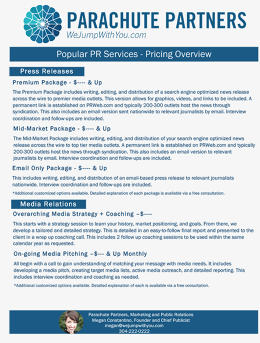If you’ve achieved a measure of success in your career, you’ve probably gotten requests from others to “pick your brain.” These may range from earnest invitations for coffee meet-ups or phone sessions, to ongoing appeals to pump you for your hard-won experience and contacts.
Of course, there’s nothing wrong with professional generosity and mentoring. However, time is a valuable resource and you don’t want to waste it on someone who isn’t serious, or who is just going to ask for short cuts you don’t want to give. But these savvy professionals have found smart ways to manage brain-picking requests—and even make money from them—without alienating prospective clients and contacts.
The Brain Dump
Anne-Marie Faiola is a serial entrepreneur whose companies, including soap-making supplier Bramble Berry Soap Making Supplies, gross more than $15 million annually. She’s also a blogger and has her own YouTube channel, so “people feel like they know me and they’re friends with me. I feel approachable to them,” she says.
That’s great for her persona, but can be problematic when it leads to lots of brain-picking requests. So, she programmed a number of email signatures that answer common questions so she can respond quickly and easily to everything from requests to sit on an organization’s board to requests for business advice and technical assistance.

One such response is a brain dump of her experience in business, as well as her favorite resources, which can help most new business owners find their way. “One answer fits most,” she says, but she also customizes each a bit for a personal touch. With just a few clicks, she can deliver a wealth of information and resources in just a few seconds of her time, saving her an estimated five to 10 hours each month.
The Price Sheet

Consultant Megan Constantino, founder of public relations and marketing firm Parachute Partners, was enjoying a nice influx of business from word-of-mouth. But as more people learned about her budding business, she was also getting her fair share of requests for free advice. As a self-described “people-pleaser,” it was tough to say “no” to such requests or to tell friends and family that she’d be happy to help them for a fee. So, Constantino developed a menu of popular services and pricing that she now sends when she gets such requests.
“I gently let them know through my pricing sheet that these are the services I offer and roughly what I charge for them. It lets them see that this is a job for me,” she says, “it’s not a hobby.”
The Revenue Stream
Business coach Meredith Liepelt, founder of consultancy Rich Life Marketing, was getting many “could you just help me with this” requests. From gratis brainstorming to free advice, she was frustrated because she was giving away so much of her time. “I have a strong desire to help people,” Leipelt admits, “but too much unpaid brain picking leads to a really dark closet and trouble paying your mortgage.”
So, Liepelt developed an a la carte program for short information sessions. Now, when someone asks for advice, she recommends her “Adventures in Brainstorming” sessions, which cost $175 per hour, by phone. Those in need of help can pay by credit card and get a fixed amount of time during which Liepelt will help them with brainstorming and business advice. She typically books at least five hours of sessions per month. Several of these clients have hired her for bigger projects, turning her formerly free advice into a new revenue stream, she says.
The Case Study
After graphic designer Larissa Pickens, owner and creative director of Float.Design, had a request for advice turn into an ongoing, multi-hour free consulting arrangement, she had a realization. “I either needed to get less nice or find a better way to deal with them,” she says.
So, when she got a request for advice from Casey Bunn, owner of Handsocks.com, to critique the website, Pickens asked her if she would be open to a new idea. Pickens would record her professional evaluation and use the video as a lesson for others interested in improving their design.
“A lot of times [people ask for] very similar advice,” she says. Bunn was thrilled with the in-depth advice. Now, Pickens plans to create one video a month and create a library of these case studies to which she can refer others who have similar issues or questions.
The Expectation Manager
Krystal Covington is both the customer service and public relations director of Natural Grocers, a regional chain of supermarkets, and the founder of Women of Denver, a professional women’s organization. Because of her high profile in the community, she gets many requests for “coffee dates” from people who want to learn more about each organization, so she’s developed some online referral sources to beat back the amount of time such requests take.

If someone is inquiring about working for Natural Grocers, Covington refers them to the website to apply online. Applicants who have questions are invited to email her a few specifics about what they need and she will send them a few suggestions about what the job entails and how to apply online.
She refers those inquiring about her professional group to her calendar on scheduling platform Frederick, which lets them schedule 15 minutes to discuss membership or 30 minutes to discuss possible sponsorships. Says Covington: “This sets expectations immediately, and helps keep the meetings and calls brief.”
Fast Company , Read Full Story
(47)